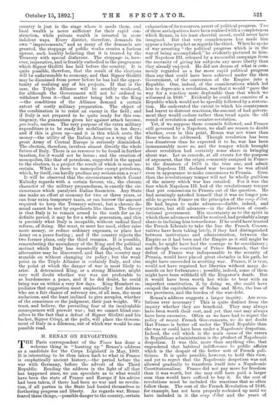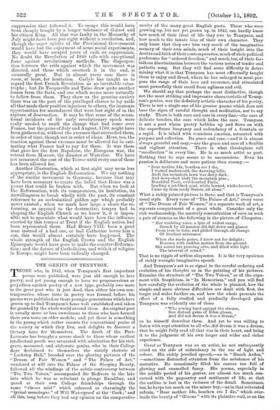M. RENAN ON REVOLUTIONS. T HE Paris correspondent of the Times
has done a welcome thing in " hunting up " Renan's address as a candidate for the Corps Legislatif in May, 1869. It is interesting to be thus taken back to what in France is emphatically ancient history,—the period before the war with Germany, before the advent of the Third Republic. Reading the address in the light of all that has happened since, we can speculate as to what would have been the state of France and Europe if his advice had been taken, if there had been no war and no revolu- tion, if all parties in the State had busied themselves in furthering progress and liberty. As regards war, Renan feared three things,—possible danger to the country, certain exhaustion of its resources, arrest of political progress. Two of these anticipations have been realised with a completeness which Renan, in his least cheerful mood, could never have imagined. But that very completeness has made him appear a false prophet as regards the third. When he spoke of war arresting " the political progress which is in the way of being accomplished," he evidently pictured to him- self Napoleon III. released by a successful campaign from the necessity of giving his subjects any more liberty than they already enjoyed. He did not dream of what is com- monly regarded as a far more rapid political progress than anv that could have been achieved under the then Government, of the conversion of the Empire into a Republic. One, indeed, of the considerations which led him to deprecate a revolution, was that it would " pave the way for a reaction more deplorable than that which we witnessed in 1848." Evidently he could not conceive of a. Republic which would not be speedily followed by a restora- tion. He underrated the extent to which his countrymen had learnt to distrust reactions, the amount of bad govern- ment they would endure rather than tread again the old round of revolution and counter-revolution.
Yet, if we suppose these counsels followed, and France still governed by a Napoleon, we shall see reason to doubt whether, even in this point, Renan was not wiser than those whom he addressed. Though revolution has been less disastrous than he expected it to be, war has been immeasurably more so, and the temper which brought about revolution had certainly some share in bringing about war. Let us concede, at all events for the purpose of argument, that the origin commonly assigned in France to the disasters of 1870 is the true one, and admit, that Napoleon III. declared war because he was afraid even in appearance to make concessions to Prussia. Even then the revolutionary temper will not be wholly guiltless of the misery which war has entailed. For it was the fear which Napoleon III. had of the revolutionary temper that put concessions to Prussia out of the question. He had seemingly satisfied himself that it was no longer pos- sible to govern France on the principles of the coup d'etat. He had begun to make advances—feeble, indeed, and tentative, but still advances—in the direction of consti- tutional government. His uncertainty as to the spirit in which these advances would be received, had probably a large share in inclining him towards war. If he could have trusted the French Liberals to take the line the French Conser- vatives have been taking lately, if they had distinguished between institutions and administration, between the Empire as it had been and the Empire as it still might be made, he might have had the courage to be conciliatory ; and though the conviction of Prince Bismarck, that the defeat of France was indispensable to the security of Prussia, would have placed great obstacles in his path, he might have succeeded in averting war. France, it is true, would not have regained her liberties without many de- mands on her forbearance ; possibly, indeed, some of them might have been withheld till the Emperor's death. But it would have been worth her while to bear with an imperfect constitution, if, by doing so, she could have escaped the capitulations of Sedan and Metz, the loss of two provinces, and the burden of the war-debt.
Renan's address suggests a larger inquiry. Are revo- lutions ever necessary ? This is quite distinct from the inquiry whether they are beneficial. They may always have been worth their cost, and yet that cost may always have been excessive. Often as we have had to regret the policy of recent French Governments, we do not doubt that France is better off under the Third Republic than she was or could have been under a Napoleonic despotism. Indeed, the evil which is the main cause of the errors in Republican administration is the product of Napoleonic despotism. It was this, more than anything else, that engendered that habitual indifference to public affairs which is the despair of the better sort of French poli- ticians. It is quite possible, however, to hold this view, and yet to regret that the Napoleonic despotism was not allowed gradually to transform itself into a Napoleonic Constitutionalism. France did not pay more for freedom than it was worth, but she may still have paid a larger sum than would have sufficed to buy it. In the cost of revolutions must be included the reactions that so often follow them. The cost of the French Revolution of 1848, for example, has not been properly reckoned up until we have included in it the coup d'etat and the years of suppression that followed it. To escape this would have been cheaply bought by a longer tolerance of Guizot and his citizen King. All that was faulty in the Monarchy of July might have been put right without a revolution, and, though the eager spirits of the Provisional Government would have lost the enjoyment of some social experiments, they would have escaped years of exile or suppression. No doubt the Revolution of 1848 tells with exceptional force against revolutionary methods. The dispropor- tion between the evils against which the movement was directed, and those which overtook it in the end, is unusually great. But in almost every case there is room, at least, for hesitation. Carlyle has taught us to regard the first French Revolution as an inevitable catas- trophe ; but De Tocqueville and Taine draw quite another lesson from the facts, and one which seems more naturally to follow from them. They show us the genuine anxiety there was on the part of the privileged classes to lay aside all that made their position injurious to others, the immense opportunities for amendment that were lost sight of in the rapture of destruction. It may be that some of the sensa- tional incidents of the early revolutionary epoch were really needed to mark the change that had come over France, but the gains of July and August, 1789, might have been gathered in, without the excesses that succeeded them, in order of time, though not in order of ideas. Here, too, the reaction against these excesses must be allowed for in esti- mating what France had to pay for them. It was these that gave her the first Napoleon, the European war, the retreat from Moscow, the disaster at Waterloo. We have not measured the cost of the Terror until every one of these has been allowed for.
Another illustration, which at first sight may seem less appropriate, is the English Reformation. We say nothing of the similar movement in Germany, because that may have been necessary to create the belief that Rome was a power that could be broken with. But when we look at the Reformation, with its compromises, its hesitation, its unwillingness to break wholly with the past, its constant reference to an ecclesiastical golden age whiqh probably never existed ; when we mark how large a share the re- forming, as opposed to the destructive, temper had in shaping the English Church as we know it, it is impos- sible not to speculate what would have been the influence exerted by this temper at Trent if the English nation had been represented there. Had Henry VIII. been a good man instead of a bad one, or had Catherine borne him a son, this would almost certainly have happened. The whole strength of the English Crown and the English Episcopate would have gone to make the counter-Reforma- tion ; and the future of Catholicism, and with it of religion in Europe, might have been radically changed.



































 Previous page
Previous page